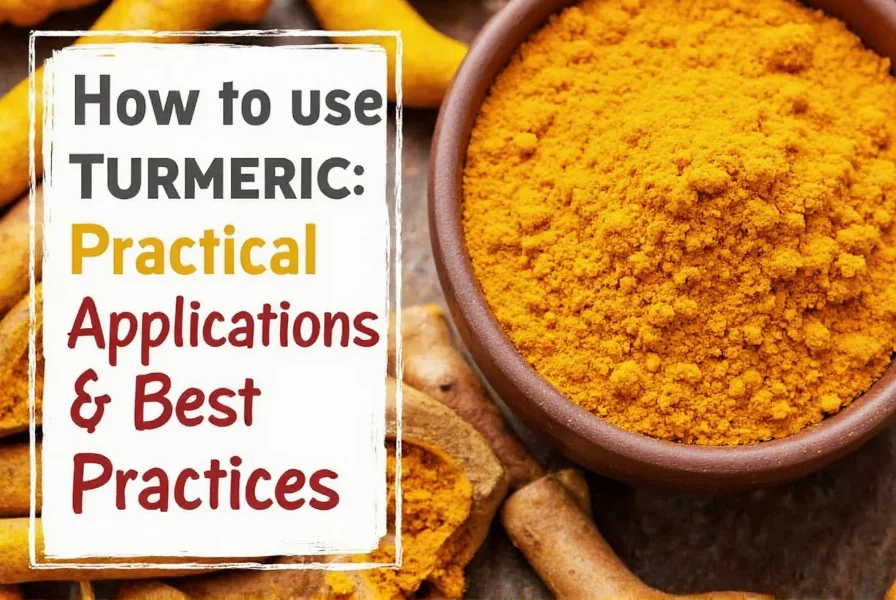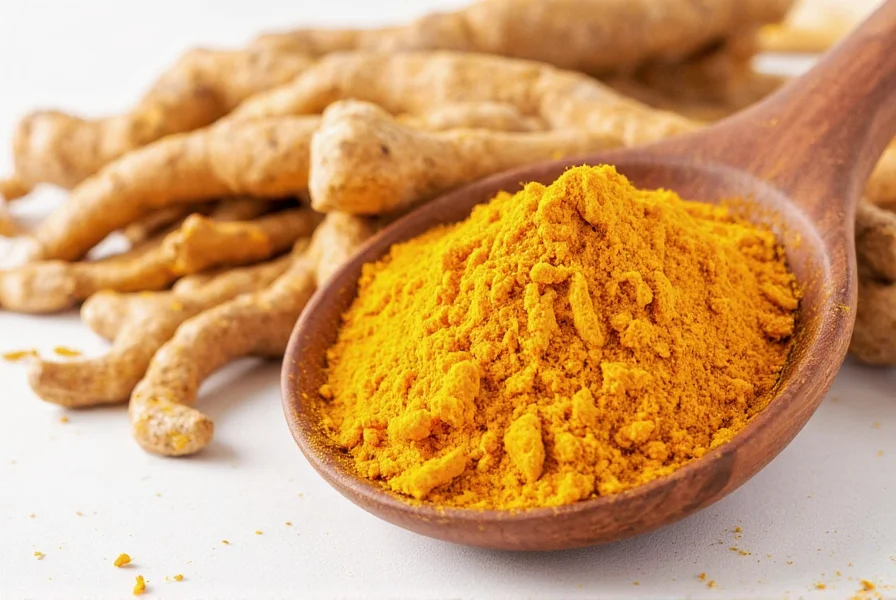Known as nature's golden spice, turmeric has been used for thousands of years in traditional medicine and cooking. Understanding how to properly use turmeric maximizes its potential health benefits while avoiding common mistakes that render its active compounds ineffective. This comprehensive guide explains practical applications backed by scientific understanding of curcumin bioavailability.
Understanding Turmeric Forms and Their Applications
Turmeric comes in several forms, each with specific usage considerations. The active compound curcumin makes up only 2-8% of raw turmeric, which explains why proper preparation methods significantly impact effectiveness. Knowing which form to use for specific purposes ensures you get the most from this powerful spice.
| Form | Best Uses | Storage | Shelf Life |
|---|---|---|---|
| Fresh root | Culinary applications, juices | Refrigerated in sealed container | 2-3 weeks |
| Ground powder | Cooking, baking, spice blends | Airtight container away from light | 1-2 years |
| Standardized supplements | Therapeutic health benefits | Cool, dry place | Check expiration date |
| Liquid extracts | Quick absorption, topical use | Dark glass bottle, cool place | 1-2 years |
Culinary Applications: How to Use Turmeric in Cooking
When incorporating turmeric into meals, heat and fat significantly increase curcumin absorption. Add turmeric early in the cooking process to activate its compounds, but avoid prolonged high heat which can degrade beneficial components. The classic Indian technique of blooming spices in oil before adding other ingredients maximizes turmeric's potential.
For how to use turmeric in cooking effectively, combine 1/2 teaspoon of turmeric powder with 1/4 teaspoon black pepper and 1 teaspoon of healthy fat (like coconut oil or olive oil) when preparing dishes. This combination increases curcumin absorption by up to 2,000%. Turmeric works well in curries, rice dishes, soups, and even smoothies. Remember that turmeric stains easily, so handle with care around light-colored surfaces.

Therapeutic Usage: Maximizing Health Benefits
Understanding how much turmeric should I take daily depends on your health goals. For general wellness, culinary use provides sufficient amounts. For specific health concerns like inflammation, research suggests consuming 500-2,000 mg of curcumin daily. Since turmeric contains only 2-8% curcumin by weight, achieving therapeutic doses through cooking alone is challenging.
The critical factor in best way to consume turmeric for inflammation involves enhancing bioavailability. Curcumin is fat-soluble and poorly absorbed on its own. Always combine turmeric with black pepper (which contains piperine) and a healthy fat source. This combination increases absorption dramatically. For example, adding just 20 mg of piperine to 2,000 mg of curcumin boosts absorption by 2,000%.
Popular Turmeric Preparations
Golden Milk Recipe
This traditional Ayurvedic beverage combines turmeric with complementary ingredients for maximum benefit. To prepare authentic turmeric golden milk recipe, heat 1 cup of milk (dairy or plant-based) with 1/2 teaspoon turmeric powder, 1/4 teaspoon cinnamon, a pinch of black pepper, and 1 teaspoon coconut oil. Simmer for 5-10 minutes, then add honey to taste. Consuming this before bed supports both inflammation reduction and sleep quality.
How to Make Turmeric Tea Properly
For an effective anti-inflammatory tea, simmer 1 cup of water with 1/2 teaspoon turmeric powder and a thin slice of fresh ginger for 10 minutes. Strain, then add the juice of half a lemon and 1/4 teaspoon black pepper. The lemon provides vitamin C which further enhances absorption, while the black pepper increases bioavailability. Drink this how to make turmeric tea properly preparation 1-2 times daily for best results.

Safety Considerations and Optimal Usage
While turmeric is generally safe, understanding proper dosage prevents potential issues. The recommended daily limit for culinary use is 1-3 grams (approximately 1/2 to 1 1/2 teaspoons) of powder. For therapeutic supplementation, most studies use 500-2,000 mg of curcumin daily. Exceeding these amounts may cause digestive discomfort or interact with certain medications.
Individuals taking blood thinners, diabetes medications, or acid-reducing drugs should consult healthcare providers before using turmeric medicinally. Pregnant women should limit turmeric to culinary amounts. Those with gallbladder issues should avoid high-dose turmeric as it may stimulate bile production.
Common Mistakes to Avoid
Many people unknowingly reduce turmeric's effectiveness through common errors. Adding turmeric to cold dishes without fat or black pepper significantly limits absorption. Using expired turmeric (beyond 2 years for powder) reduces potency. Consuming therapeutic doses without proper enhancers makes turmeric dosage for health benefits ineffective. Remember that does black pepper increase turmeric absorption is not just a myth—it's scientifically proven essential for maximum benefit.
Maximizing Long-Term Benefits
Consistency matters when using turmeric for health purposes. Incorporate it daily rather than sporadically for cumulative benefits. Store turmeric properly in a cool, dark place to preserve potency. When using fresh root, peel and grate it directly into dishes for maximum freshness. For supplements, choose formulations with enhanced absorption technology if you cannot consume them with food containing fats and black pepper.
Conclusion
Using turmeric effectively requires understanding both its culinary versatility and therapeutic potential. By combining it with black pepper and healthy fats, you dramatically increase its bioavailability. Whether you're making a simple curry, preparing golden milk, or taking supplements for specific health concerns, proper usage ensures you receive turmeric's full spectrum of benefits. Remember that consistency and correct preparation methods matter more than large quantities when harnessing this golden spice's power.
Frequently Asked Questions
What's the most effective way to use turmeric for inflammation relief?
The most effective approach combines 500-1,000 mg of curcumin with 5-20 mg of piperine (from black pepper) and a healthy fat source. This combination increases absorption by up to 2,000%. Consuming this formulation twice daily with meals provides consistent anti-inflammatory benefits. For culinary use, add 1/2 teaspoon turmeric powder with black pepper and oil when cooking.
Can I use turmeric topically, and how should I apply it?
Yes, turmeric can be used topically for skin benefits. Create a paste with 1 teaspoon turmeric powder, 1 teaspoon honey, and enough milk or yogurt to form a spreadable consistency. Apply to clean skin for 15-20 minutes before rinsing. Always do a patch test first, as turmeric can temporarily stain light skin yellow. For acne or inflammation, add a few drops of tea tree oil to the mixture.
How long does it take to see results from regular turmeric consumption?
Most people notice subtle improvements in joint comfort and reduced inflammation within 4-8 weeks of consistent daily use at therapeutic doses (500-2,000 mg curcumin). Maximum benefits typically appear after 8-12 weeks. Culinary use provides more gradual, long-term benefits rather than immediate effects. Consistency is key—regular daily consumption works better than sporadic high doses.
Is fresh turmeric root more effective than powdered turmeric?
Fresh turmeric root contains slightly higher curcumin levels and additional beneficial compounds not found in powder. However, both forms are effective when used properly. Fresh root provides about 3-4% curcumin by weight compared to 2-8% in powder (which varies by quality). The key factor isn't the form but how you prepare it—with black pepper and fat for maximum absorption—regardless of whether you use fresh or dried turmeric.
Can I take turmeric supplements on an empty stomach?
It's not recommended to take turmeric supplements on an empty stomach as curcumin is fat-soluble and requires dietary fat for proper absorption. Taking supplements without food reduces effectiveness by up to 90%. Additionally, high-dose turmeric on an empty stomach may cause digestive discomfort in some individuals. Always consume turmeric supplements with a meal containing healthy fats for optimal results.











 浙公网安备
33010002000092号
浙公网安备
33010002000092号 浙B2-20120091-4
浙B2-20120091-4